第一单元 句子成分
高一课标必修1unit1句子成分

句子成分(Members of a Sentence)什么叫句子成分呢?句子的组成成分叫句子成分。
在句子中,词与词之间有一定的组合关系,按照不同的关系,可以把句子分为不同的组成成分。
句子成分由词或词组充当。
现代汉语里一般的句子成分有六种,即主语、谓语、宾语、定语、状语和补语。
英语的基本成分有七种:主语(subject)、谓语(predicate)、表语(predicative)、宾语(object)、定语(attribute)、状语(adverbial) 和补语(complement)。
英语句子的基本结构可以归纳成五种基本句型及其扩大、组合、省略或倒装。
掌握这五种基本句型,是掌握各种英语句子结构的基础。
英语五种基本句型列式如下:一:SV(主+谓)二:SVP(主+系+表)三:SVO(主+谓+宾)四:SVoO(主+谓+间宾+直宾)五:SVOC(主+谓+宾+宾补)基本句型一:SV(主+谓)主语:可以作主语的成分有名词(如boy),主格代词(如you),动词不定式,动名词等。
主语一般在句首。
注意名词单数形式常和冠词不分家!谓语:谓语由动词构成,是英语时态、语态变化的主角,一般在主语之后。
不及物动词(vi.)没有宾语,形成主谓结构,如:We come.此句型的句子有一个共同特点,即句子的谓语动词都能表达完整的意思。
这类动词叫做不及物动词,后面可以跟副词、介词短语、状语从句等。
S│V(不及物动词)1. The sun │was shining. 太阳在照耀着。
2. The moon │rose. 月亮升起了。
3. The universe │remains. 宇宙长存。
4. We all │breathe, eat, and drink. 我们大家都呼吸、吃和喝。
5. Who │cares? 管它呢?6. What he said │does not matter. 他所讲的没有什么关系。
7. They │talked for half an hour. 他们谈了半个小时。
第一单元句子成分

第一单元句子成分句子的主要成分有主语和谓语;次要成分有表语、宾语、定语、状语、补足语、同位语和插入语。
一、主语subject主语可由名词(或名词词组)、代词、数词、不定式(短语)、动名词(短语)、名词化的形容词和主语从句等表示。
1. During the 1990s, American country music has become more and more popular.2. We ofte n speak En glish in class.3.One is eno ugh.4. To swim in the river is a great pleasure.5.Smoking does harm to the health.6. The rich should help the poor.名词化的形容词7. When we are going to have an English test has not been decided.8.It is necessary to master a foreign Ianguage.(it作形式主语,真正的主语为后面的不定式)兴the+形容词/过去分词,表示一类人。
二、谓语predicate谓语说明主语所做的动作或具有的特征和状态。
动词在句中作谓语,一般放在主语之后。
谓语的构成如下:1、简单谓语:由一个动词或动词短语构成。
如:He practices running every morning.The plane took off at 10 o'clock.2、复合谓语:(1)由情态动词加动词原形构成。
如:You may keep the book for two weeks.(2)由助动词加动词原形,现在分词,过去分词构成。
如:Do you speak En glish?They are working in a field. He has caught a bad cold.(3)由系动词加表语构成。
(完整版)初中语文句子成分讲解.doc
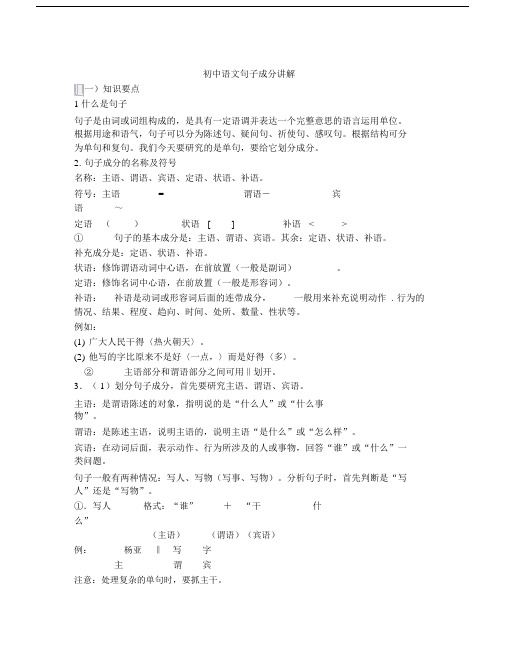
初中语文句子成分讲解一)知识要点1什么是句子句子是由词或词组构成的,是具有一定语调并表达一个完整意思的语言运用单位。
根据用途和语气,句子可以分为陈述句、疑问句、祈使句、感叹句。
根据结构可分为单句和复句。
我们今天要研究的是单句,要给它划分成分。
2.句子成分的名称及符号名称:主语、谓语、宾语、定语、状语、补语。
符号:主语= 谓语-宾语~定语()状语 [ ] 补语 < >①句子的基本成分是:主语、谓语、宾语。
其余:定语、状语、补语。
补充成分是:定语、状语、补语。
状语:修饰谓语动词中心语,在前放置(一般是副词)。
定语:修饰名词中心语,在前放置(一般是形容词)。
补语:补语是动词或形容词后面的连带成分,一般用来补充说明动作 . 行为的情况、结果、程度、趋向、时间、处所、数量、性状等。
例如:(1)广大人民干得〈热火朝天〉。
(2)他写的字比原来不是好〈一点,〉而是好得〈多〉。
②主语部分和谓语部分之间可用‖划开。
3.( 1)划分句子成分,首先要研究主语、谓语、宾语。
主语:是谓语陈述的对象,指明说的是“什么人”或“什么事物”。
谓语:是陈述主语,说明主语的,说明主语“是什么”或“怎么样”。
宾语:在动词后面,表示动作、行为所涉及的人或事物,回答“谁”或“什么”一类问题。
句子一般有两种情况:写人、写物(写事、写物)。
分析句子时,首先判断是“写人”还是“写物”。
①.写人格式:“谁”+“干什么”例:主杨亚(主语)(谓语)(宾语)‖写字谓宾注意:处理复杂的单句时,要抓主干。
例:一中的杨亚║在课桌上写着毛笔字。
主谓宾②.写物格式:“什么事”或“什么物”+“怎么样”(主语)(谓语、宾语)例:猫‖捉鱼主谓宾例:一只小猫‖在盆边捉了一条大鱼主谓宾注意:“是”为典型的动词,一般是“谓语”。
例如:他‖是学生主谓宾(2)划分句子成分,还要抓住枝干(定语、状语、补语)定语:在句子中起着修饰、限制主语或宾语中心语的作用。
状语:修饰、限制谓语中心语,一般在谓语中心语前面,有的在句子最前面,交待时间、地点、范围、情况等。
高一英语《英语句子成分及基本结构》PPT课件

谓语(predicate)
谓语说明主语所做的动作或具有的特征和状态。
动词在句中作谓语,一般放在主语之后。谓语的
构成如下:
• 1、简单谓语:由一个动词或动词短语构成。如: He practices running every morning. 2、复合谓语:由情态动词或其他助动词加动词 原形构成。如:You may keep the book for
(介词短语)
We will soon make our city what your city is now. (从句)
定语(attributive)
修饰名词或代词的词、短语或从句称为定语。定语可由以下等成 分表示:
Guilin is a beautiful city.(形容词) China is a developing country; America is a developed country. (分词) There are thirty women teachers in our school.(名词) His rapid progress in English made us surprised.(代词) Our monitor is always the first to enter the classroom.(不定式 短语) The teaching plan for next term has been worked out.(动名词) He is reading an article about how to learn English.(介词短语)
独立成分
有时句子中会有一些与句子没有语法联系的成分,称为句 子独立成分 感叹词:oh,hello,aha,ah,等。 肯定词yes 否定词no 称呼语:mum, dad。 插入语:一些句中插入的 I think , I believe,等。 如: The story, I think, has never come to the end 情态词,表示说话人的语气(多作为修饰全句的状 语):perhaps也许,maybe大概,actually实际上,certainly当 然,等。
小学语文句子成分

小学语文句子成分首先,让我们来了解一下句子成分的基本概念。
句子成分是指句子中各个部分在句子结构中所起的作用。
通常包括主语、谓语、宾语、定语、状语和补语等。
这些成分在句子中扮演着不同的角色,起着连接、修饰、说明等不同的作用。
主语是句子的主要组成部分,它通常是句子中的“主角”,是句子所叙述的对象。
主语一般位于句子的开头,它可以是一个名词、代词、数词或者是由名词性成分构成的词组。
比如,“小明”、“这本书”等都可以作为句子的主语。
谓语是句子中的核心成分,它表示动作或者状态。
谓语通常由动词构成,它可以单独构成谓语动词,也可以由动词短语或者是由动词和它的宾语、状语等构成。
比如,“跑”、“在学习”等都可以作为句子的谓语。
宾语是句子中的重要成分,它通常是动作的承受者或者是动作的对象。
宾语一般位于谓语动词之后,它可以是名词、代词或者是由名词性成分构成的词组。
比如,“苹果”、“这本书”等都可以作为句子的宾语。
定语是对名词或代词进行修饰或者限定的成分。
它通常位于被修饰的名词或代词之前,用来对名词或代词进行修饰或者限定。
定语可以是形容词、数词、代词、名词或者是由这些词构成的词组。
比如,“红色的”、“三个”等都可以作为句子的定语。
状语是句子中的修饰成分,它用来修饰动词、形容词、副词或者整个句子。
状语可以表示时间、地点、原因、条件、方式、程度等不同的概念。
比如,“昨天”、“在教室里”等都可以作为句子的状语。
补语是对及物动词、系动词或者是感官动词的补充说明。
它通常位于主语、谓语之后,用来对主语或者是谓语进行补充说明。
补语可以是形容词、名词、代词或者是由这些词构成的词组。
比如,“很高兴”、“是一名医生”等都可以作为句子的补语。
通过对句子成分的了解,我们可以更好地理解句子的结构和意义,从而提高我们的语文水平。
希望同学们能够认真学习句子成分这一知识点,加强练习,提高自己的语文能力。
相信在老师和家长的指导下,同学们一定能够掌握句子成分这一知识点,取得更好的学习成绩。
小学科学划分句子成分
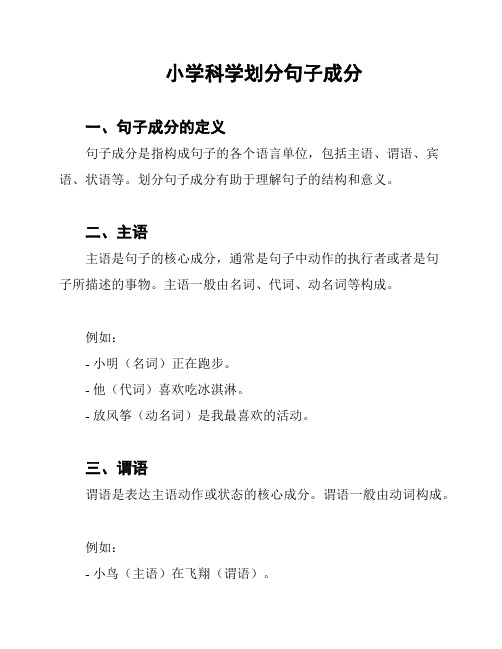
小学科学划分句子成分
一、句子成分的定义
句子成分是指构成句子的各个语言单位,包括主语、谓语、宾语、状语等。
划分句子成分有助于理解句子的结构和意义。
二、主语
主语是句子的核心成分,通常是句子中动作的执行者或者是句
子所描述的事物。
主语一般由名词、代词、动名词等构成。
例如:
- 小明(名词)正在跑步。
- 他(代词)喜欢吃冰淇淋。
- 放风筝(动名词)是我最喜欢的活动。
三、谓语
谓语是表达主语动作或状态的核心成分。
谓语一般由动词构成。
例如:
- 小鸟(主语)在飞翔(谓语)。
- 我(主语)是老师(谓语)。
四、宾语
宾语是句子的补充成分,用来说明动作的对象或者受事者。
宾语一般由名词、代词等构成。
例如:
- 我喜欢吃苹果。
这里的“吃苹果”是动作,苹果是宾语。
- 妈妈请我去超市购物。
这里的“请去超市购物”是动作,我是宾语。
五、状语
状语是用来修饰动作的成分,可以表示时间、地点、方式、原因等。
状语一般由副词、介词短语、动词短语等构成。
例如:
- 我昨天去了图书馆(状语表示时间)。
- 小狗快乐地跑进了家里(状语表示方式)。
- 我因为生病没有去上学(状语表示原因)。
六、总结
划分句子成分有助于理解句子的语法和意思。
在划分句子成分时,需要注意句子的逻辑关系和语法结构。
理解句子成分的作用和特点可以帮助我们更准确地理解和表达语言。
unit1语法:句子成分和句子结构讲述
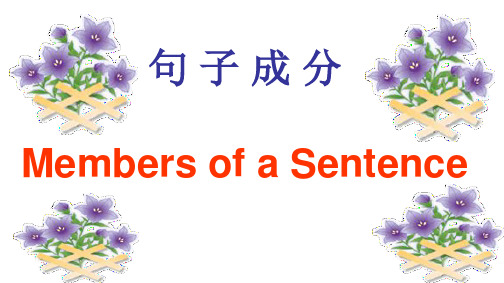
To make his dream come true, Tom
becomes very interested in business. 为实现梦想,汤姆变得对商业很有兴趣.
状语从句:
时间状语从句、地点状语从句、原因状语从句、 结果状语从句、目的状语从句、比较状语从句、 让步状语从句、条件状语从句
首先,让我们来了解一下主语,谓语,宾语,表语。
1. 主语 ( Subject )
表示句子说的是“什么人” 或 “什么事”。 通常由名词、代词、主语从句或动名词短语等充当。
例如: 1. My teacher hates telling lies.(指老师这个人)
2. Great changes have taken place in China in
(students是we的同位语,都是指同一批‘学生’)
We all are students.
(all是we的同位语,都指同样的‘我们’)
10、独立成分:
与全句没有语法关系的句子成分叫做句子的独立成分 感叹词:oh, hello, aha, ah,等。 肯定词:yes 否定词:no 称呼语:称呼人的用语。 插入语:一些句中插入的 I think , I believe,等。 如 : The story, I think, has never come to the end. 我相信,这个故事还远没结束.
定语通常位于被修饰的成分前。
复合不定代词(something/nothing)之后; 不定式/分词短语/从句作定语时要放在被修饰的成分后;
副词用作定语时须放在名词之后。
Two boys need two pens. His name is Tom. The boy in blue is Tom. The boy there needs a pen. The boy needs a ball pen. There is nothing to do today.
一年级上册语文教材第一单元的语文要素

第一单元的语文要素一、词语1. 词义本单元的词语主要包括“天、地、人、种、树、草、花、叶、木”等与自然环境有关的词语,通过这些词语来营造出一个和谐美丽的自然景象。
2. 词性这些词语大多属于名词和动词,用来描绘自然界的景物,如“树”、“草”、“开”、“落”等。
3. 词语搭配一些常见词语还可以进行搭配,如“天空”、“草地”、“树叶”等,通过搭配能够更加生动地描绘出自然界的景物。
二、句子1. 句子结构本单元主要包括一些简单的句子结构,如“天空明净,云、淡淡的,飘荡在林梢;林下、一片一片的绿波,四处拂过”等,这些简单的句子通过描绘自然景色,展现了自然界的美丽和和谐。
2. 句子成分在这些简单的句子中,包括了主语“天空”、“云”、“绿波”等和谓语“明净”、“飘荡”等,通过这些句子成分,能够更加明了地展现出自然界的景象。
三、段落1. 段落结构本单元的文章主要由一些描写自然景色的段落组成,每段都有一个明确的主题和中心思想,通过段落之间的衔接,构成了整篇文章的有机结构。
2. 段落衔接在文章的开头,作者以“天”、“地”、“人”等自然要素为切入点,通过几个简单的句子描绘了自然景色,然后逐步展开,展现了自然界的美丽和和谐。
四、语段1. 语段结构本单元的语文教材以描写自然景色的语段为主,每个语段都围绕着自然界的要素展开,通过生动的描写、形象的比喻,展现了自然界的美丽和和谐。
2. 语段衔接在整篇文章中,每个语段都紧密衔接,通过描写自然界的各个部分,最终呈现出一幅丰富多彩、和谐美丽的自然景象。
五、个人观点和理解本单元的文章通过描写自然界的景象,营造了一种和谐美丽的氛围,让人感受到大自然的魅力和生机。
通过学习这些词语、句子、段落以及整篇文章的结构,不仅能够提高语文素养,还能够培养对自然的热爱和对美的感悟能力。
总结本文以“天、地、人、种、树、草、花、叶、木”等自然要素为主题,通过分析词语、句子、段落、语段的结构和特点,描绘了一幅自然界的美丽景象。
英语句子结构和成分详解
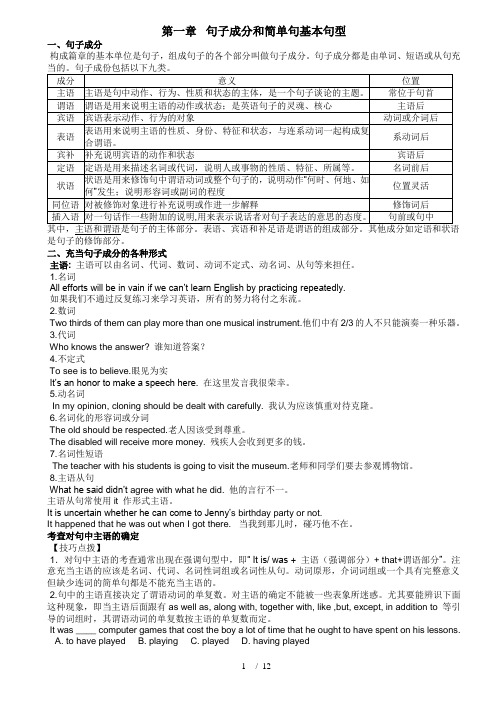
第一章句子成分和简单句基本句型一、句子成分构成篇章的基本单位是句子,组成句子的各个部分叫做句子成分。
句子成分都是由单词、短语或从句充其中,主语和谓语是句子的主体部分。
表语、宾语和补足语是谓语的组成部分。
其他成分如定语和状语是句子的修饰部分。
二、充当句子成分的各种形式主语:主语可以由名词、代词、数词、动词不定式、动名词、从句等来担任。
1.名词All efforts will be in vain if we can’t learn English by practicing repeatedly.如果我们不通过反复练习来学习英语,所有的努力将付之东流。
2.数词Two thirds of them can play more than one musical instrument.他们中有2/3的人不只能演奏一种乐器。
3.代词Who knows the answer? 谁知道答案?4.不定式To see is to believe.眼见为实It’s an honor to make a speech here. 在这里发言我很荣幸。
5.动名词In my opinion, cloning should be dealt with carefully. 我认为应该慎重对待克隆。
6.名词化的形容词或分词The old should be respected.老人因该受到尊重。
The disabled will receive more money. 残疾人会收到更多的钱。
7.名词性短语The teacher with his students is going to visit the museum.老师和同学们要去参观博物馆。
8.主语从句What he said didn’t agree with what he did. 他的言行不一。
主语从句常使用it 作形式主语。
It is uncertain whether he can come to Jenny’s birthday party or not.It happened that he was out when I got there. 当我到那儿时,碰巧他不在。
第一单元 课堂:句子成分及基本句型

第一单元句子成分及基本句型第一节句子的成分在英文中句子成分包括:主语、谓语、宾语(直接宾语、间接宾语)、表语、定语和状语、宾语补足语等。
(一)主语:主语是一个句子的主体。
一般由名词、代词、不定式或相当于名词的词或短语来充当。
位置:句首注意:1.必须有,可多(祈使句-特殊情况)2.动词不能当主语(注意区别do ,doing动名词与to do 不定式的区别)例句:(1)Lucy is a beautiful nurse. (名词作主语)(2)He reads newspapers every day. (代词作主语)(3)Smoking is harmful to the health. (动名词作主语)(4)To swim in Kunming Lake is a great pleasure.(不定式作主语)(5)What we should do is not yet decided. (主语从句作主语)(二)谓语说明主语“做什么”“是什么”或“怎么样”。
谓语(谓语部分里主要的词)必须是动词。
谓语和主语在人称和数两方面必须一致。
位置:在主语后面考点:1.谓语必须是动词,每一个句子都有且仅有一个谓语动词,2 每一个谓语动词都要注意时态的变化(八大时态与主被动形式全部表现在谓语上)人称与数的变化3.能充当谓语的动词有系动词,行为动词(及物动词与不及物动词)注意:并列句不冲突谓语有且仅有一个的原则I go to school and have a class.=I go to school and I have a class.如:His parents are teachers. (系动词和表语一起作谓语)We study hard. (行为动词作谓语)We don’t finish reading the book. (助动词和行为动词一起作谓语)He can speak English. (情态动词和行为动词一起作谓语)(三)宾语宾语是动作、行为的对象,由名词、代词、不定式或相当于名词的词、短语来担任,它和及物动词一起说明主语做什么。
初中语文知识点句子成分的划分

初中语文知识点句子成分的划分句子成分是指句子中的各个部分,用于表示不同的语法功能。
常见的句子成分包括主语、谓语、宾语、表语、定语、状语、补语和宾语补足语等。
1.主语:句子中表示动作的执行者或所指称的人或事物的名称。
一般位于句子的谓语之前。
例如:-李明学习很努力。
(主语:李明)-这本书很有趣。
(主语:这本书)2.谓语:句子中表示主语动作、状态或存在情况的部分。
一般是动词或动词词组。
例如:-他跑步去了操场。
(谓语:跑步去了)-她是一位医生。
(谓语:是)3.宾语:句子中表示谓语动作所作用的对象或承受动作的人或事物。
一般位于及物动词之后。
例如:-我吃了一个苹果。
(宾语:一个苹果)-她买了一本书。
(宾语:一本书)4.表语:句子中表示主语状态、性质或特征的部分。
一般位于系动词之后。
例如:-我很高兴。
(表语:高兴)-这本书看起来很有趣。
(表语:有趣)5.定语:句子中修饰名词或代词的成分,用来描述或限定名词的内容。
例如:-那个高个子男孩是我弟弟。
(定语:那个高个子)-我喜欢的那本书很有趣。
(定语:我喜欢的)6.状语:句子中修饰动词、形容词、副词和整个句子的成分,表示程度、时间、地点、原因等意义。
例如:-他昨天去了图书馆。
(状语:昨天)-她慢慢地走进了房间。
(状语:慢慢地)7.补语:句子中用来补充说明主语或宾语的成分。
例如:-我们选他为队长。
(补语:队长)-这个问题对我来说很重要。
(补语:重要)8.宾语补足语:句子中用来补充说明宾语的成分,常常表示宾语的状态、特征等,多由形容词、名词、介词短语等充当。
例如:-我认为她很漂亮。
(宾语补足语:漂亮)-她被评为最佳运动员。
Unit1 高一句子成分分析

主动语态变成被动语态后,宾语补足语变成主补 主动语态变成被动语态后 宾语补足语变成主补. 宾语补足语变成主补 I last saw him playing near the river. →He was last seen playing near the river. Theteacher caught the student cheating in the exam → The student was caught cheating in the exam We made him monitor. → He was made monitor. He pushed the door open. →The door was pushed open.
㈡语
• • • • • 简单谓语:由动词或动词词组组成 简单谓语 由动词或动词词组组成 I saw the flag on the top of the hill? He looked after two orphans. 由情态动词或助动词+动词 动词; 复合谓语 由情态动词或助动词 动词 He can speak English well.
㈢表语
• • • • • • • 在系动词后的部分就是表语 常见的系动词有: 常见的系动词有 be(am,is,are,were,was),appear,look,seem, feel,smell,taste,sound,keep,turn,become, get,grow,come,go etc. 系动词不用于被动语态. 系动词不用于被动语态 The apple tastes sweet.
• I stayed awake until 11:30 one evening in order to have a good look at the moon for once by myself. • Anne named her diary kitty because she thought it was her best friend.
初中英语语法——句子成分精讲
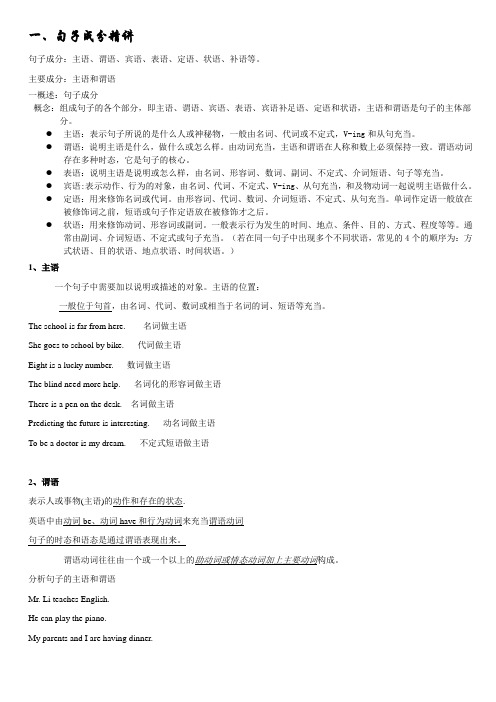
一、句子成分精讲句子成分:主语、谓语、宾语、表语、定语、状语、补语等。
主要成分:主语和谓语一概述:句子成分概念:组成句子的各个部分,即主语、谓语、宾语、表语、宾语补足语、定语和状语,主语和谓语是句子的主体部分。
●主语:表示句子所说的是什么人或神秘物,一般由名词、代词或不定式,V-ing和从句充当。
●谓语:说明主语是什么,做什么或怎么样。
由动词充当,主语和谓语在人称和数上必须保持一致。
谓语动词存在多种时态,它是句子的核心。
●表语:说明主语是说明或怎么样,由名词、形容词、数词、副词、不定式、介词短语、句子等充当。
●宾语:表示动作、行为的对象,由名词、代词、不定式、V-ing、从句充当,和及物动词一起说明主语做什么。
●定语:用来修饰名词或代词。
由形容词、代词、数词、介词短语、不定式、从句充当。
单词作定语一般放在被修饰词之前,短语或句子作定语放在被修饰才之后。
●状语:用来修饰动词、形容词或副词。
一般表示行为发生的时间、地点、条件、目的、方式、程度等等。
通常由副词、介词短语、不定式或句子充当。
(若在同一句子中出现多个不同状语,常见的4个的顺序为:方式状语、目的状语、地点状语、时间状语。
)1、主语一个句子中需要加以说明或描述的对象。
主语的位置:一般位于句首,由名词、代词、数词或相当于名词的词、短语等充当。
The school is far from here. 名词做主语She goes to school by bike.代词做主语Eight is a lucky number.数词做主语The blind need more help.名词化的形容词做主语There is a pen on the desk. 名词做主语Predicting the future is interesting.动名词做主语To be a doctor is my dream.不定式短语做主语2、谓语表示人或事物(主语)的动作和存在的状态.英语中由动词be、动词have和行为动词来充当谓语动词句子的时态和语态是通过谓语表现出来。
第一课小学阶段英语句子成分分析

Unit 1 句子成分分析1. 句子成分主要有:主语:一般为名词或者代词,是全句述说的对象,一般放在句首。
I study English.谓语:只会是动词充当,表示主语的动作或状态,一般放在主语后面。
I study English.宾语:一般为名词或者代词,表示动作的对象,一般放在及物动词(vt.)或者介词后面。
I study English. I play with him.表语:一般为名词或者形容词或者代词She is a teacher. We are happy.定语:一般为形容词或者形容词短语,用于说明或者限制名词的成分,一般放在名词前面。
I have a red pen.状语:一般为副词或者副词短语,用于修饰动词、形容词或副词。
The students study hard.*各类词语的缩写:名词 (n.)noun 形容词 (adj.) adjective 动词 (v.)verb 介词(prep.)preposition代词 (pron.)pronoun 副词 (adv.)adverb连词 (conj.)conjunction2. 一般句子构成:主语+谓语+宾语(表示“谁做什么”、“什么做什么”)主语+be动词+表语(表示“什么是什么”、“什么怎么样”)E.g. I play basketball.He is a clever student.改为否定句:谓语动词是实意动词的,要借助助动词do,放在实意动词前,然后在助动词后加not没有实意动词,谓语动词是be动词时,直接在be动词后加not *实意动词:具有具体意义的词,例如:吃,唱,写,画注意:助动词与not缩写的形式、be动词与not缩写的形式do not= don’t am not= am not was not=wasn’tdoes not= doesn’t is not= isn’t were not= weren’t did not= didn’t are not=aren’t练习1. 判断下列是否是一个完整的句子1) The teacher in the classroom2) Sang many songs and danced happily.练习2. 请分析下面句子的结构并说出成分1)I have two elder sisters.2) They don’t swim very well.练习3. 句型变换肯定句:I like music. He likes music.否定句:I like music. He like music.一般疑问句:Do you like music Does he like musicI have two sisters.改为否定句:改为一般疑问句:I like to play with Jane.改为否定句:练习4.连词成句注意句子成分分析,首字母注意大写,写上标点符号。
高中英语句子成分划分详解(全)
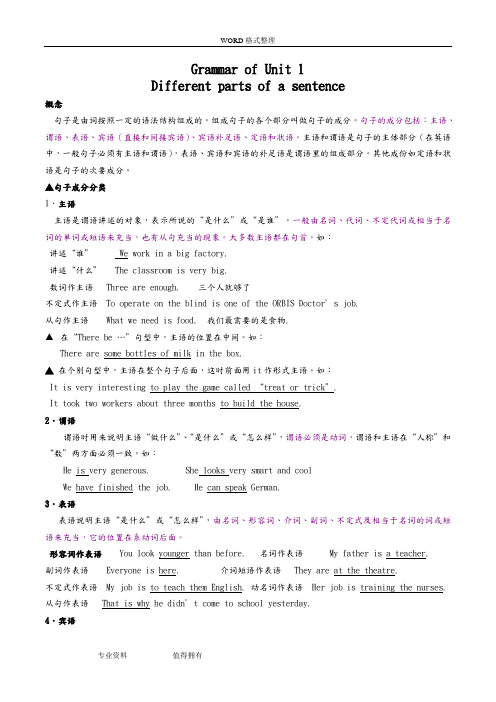
Grammar of Unit 1Different parts of a sentence概念句子是由词按照一定的语法结构组成的。
组成句子的各个部分叫做句子的成分。
句子的成分包括:主语、谓语、表语、宾语(直接和间接宾语)、宾语补足语、定语和状语。
主语和谓语是句子的主体部分(在英语中,一般句子必须有主语和谓语),表语、宾语和宾语的补足语是谓语里的组成部分。
其他成份如定语和状语是句子的次要成分。
▲句子成分分类1.主语主语是谓语讲述的对象,表示所说的“是什么”或“是谁”。
一般由名词、代词、不定代词或相当于名词的单词或短语来充当,也有从句充当的现象。
大多数主语都在句首。
如:讲述“谁” We work in a big factory.讲述“什么” The classroom is very big.数词作主语 Three are enough. 三个人就够了不定式作主语 To operate on the blind is one of the ORBIS Doctor’s job.从句作主语 What we need is food. 我们最需要的是食物.▲在“There be …”句型中,主语的位置在中间。
如:There are some bottles of milk in the box.▲在个别句型中,主语在整个句子后面,这时前面用it作形式主语。
如:It is very interesting to play the game called “treat or trick”.It took two workers about three months to build the house.2.谓语谓语时用来说明主语“做什么”、“是什么”或“怎么样”,谓语必须是动词,谓语和主语在“人称”和“数”两方面必须一致。
如:He is very generous. She looks very smart and coolWe have finished the job. He can speak German.3.表语表语说明主语“是什么”或“怎么样”,由名词、形容词、介词、副词、不定式及相当于名词的词或短语来充当,它的位置在系动词后面。
高一语文:句子成分划分PPT

句例:
• l2、今天 是 星期六。 • l3、语言 [要]简洁〈一些〉。 • l4、长江三峡 [曾经]留下〈过〉(许多 人的)梦。
六.修饰成分的排序
• 1.多层定语的排列顺序 • 多层定语的一般次序: 领属+数量+动词短语+ 形容词+名词。 • 句例:(国家队里)的(一位)(有二十多年 教学经验)的(优秀)的(篮球)(女)教练。 • 2.多层状语的排列顺序 • l多层状语的一般次序:何时+何地+副词+形容 词+介宾短语 • l句例:[昨天][在休息室里][都][热情地][同他] 交谈。
与主谓相关的古汉语特殊句式
倒装句中的主谓倒装 渺渺兮予怀。 小人哉,樊须也! 判断句中直接用名词充当谓语表判断 其人勇士。 刘备天下枭雄。 妪,先大母婢也。
与宾语相关的古汉语特殊句式 宾语前置 • 1、在否定句中,代词作宾语,宾 语前置。“不”、“未”、“毋”、 “莫”等否定词 例、古之人不余欺也。
插入语 ①在句中引起对方注意的:你看、你听、你想想、 大家看看、请看…… ②表示对情况推测的:据我看、看样子、看起来、 说不定…… ③表示信息的来源,说法的依据,或表示对某件 事的分析:据说、相传、一般说来…… ④表示强调、包括、举例、解释或在句子开头起 关联作用的:尤其是…… 、包括…… 、例如、 这就是、首先、总而言之……例: 所有报纸,包括《人民日报》,都应重视这个问 题。(书写时,插入语前后一般要有逗号。)
宾语
宾语:在动词后面,表示动作、行为所 涉及的人或事物,回答“谁”或“什 么”一类问题。 例:什么叫做信息? 门口围着一群看热闹的。 大家认为他很有勇气。 他是学生。 我们拥有青春。 (能做主语的一般都能做宾语)
语文句子成分--小学

句子成分简介句子的成分:句子的成分主要有主语、谓语、宾语、定语、状语、补语在一个比较完整的陈述句中,句子中各种成分之间的关系一般是:[状语]+(定语)+主语|+[状语]+谓语+<补语>+(定语)+宾语1、主语:主语是句子中的陈述对象,多表示人或事物,常用名词或代词。
说明是“谁”或者是“什么”。
简而言之—发出动作的主体就是主语。
中国人民志气高。
那两个服务员忙掏出手机。
2、谓语:谓语是对句子主语做陈述的部分,是对主语的叙述、描写或判断,说明主语“怎么样”。
简而言之—主语发出的动作就是谓语。
漫天的乌云顿时消散了。
树叶黄了。
3、宾语:宾语是谓语动词的支配成分,是谓语动词直接作用的对象,表示动作行为的对象、结果、处所和工具等。
可以回答主语做了“什么”或是“什么”的问题。
简而言之—主语做的事情就是宾语。
敌人监视着苇塘。
门口围着一群看热闹的人。
4、定语:定语是句子中名词中心语前头的修饰成分,说明事物的性质、状态、或限定事物的领属、质料、数量等。
描写性定语,多由形容词性成分充当。
助词“的”是定语的标志。
定语和中心语的组合,有的必须加“的”,有的不能加“的”,有的可加可不加。
单音节形容词作定语,通常不加“的”,例如:(红)花、(绿)叶、(新)学校、(好)主意等。
双音节形容词作定语,常常加上“的”,特别是用描写状态的词,例如:(晴朗)的天、(优良)的传统、(动听)的歌声、(粉红)的脸等。
那(沉甸甸的)稻谷、像一垄垄(金黄的)珍珠。
(三杯)美酒敬亲人5、状语:状语是句子中动词或形容词中心语前头的修饰成分,表示动作的方式、状态、时间、处所或性状的程度等。
[午后],天很闷,风很小。
[白]跑一趟。
(方式)她的身上[净]是水。
(净=全,表范围)助词“地”是状语的标志。
状语后面加不加“地”的情况很复杂。
单音节副词做状语,一定不加,有些双音节副词加不加“地”均可,例如“非常热︰非常地热”。
形容词里,单音节形容词做状语比较少,大都也不能加“地”,例如“快跑、苦练、大干”。
句子成分-初级

句子成分-初级第一篇:句子成分-初级句子成分一、词类实词:N.Pron.Num.Adj.Adv.V.可以在句子中单独作一定成分虚词:Art.Prep.Conj.Int.不能在句子中单独作一定成分,只起辅助和连接作用。
二、句子成分定义:句子成分由作用不同的各部分组成,这些部分就叫做句子成分。
句子成分可以是单词,也可以是词组或从句。
在句中起主要作用的句子成分有主语和谓语,成为主要成分;起次要作用的有宾语,宾语补语,定语,状语,表语等,称为次要成分。
三、词类和句子成分的关系(一)词类相互间的关系1、形容词,数词,名词常修饰名词It’s a They are women doctors.2、形容词可以修饰代词不定代词+形容词)3、副词常修饰动词,形容词和副词(二)词类和句子成分之间的关系1、主语:是句子要说明的人或物,是句子的主体,一般放在句首。
作主语的词类有:名词,代词,数词。
(动名词,动词不定式和主语从句也可做主语。
)He reads newspaper every day.2、谓语动词可以是行为动词,系动词,助动词和情态动词。
He3、宾语:及物动词涉及到的人或物成为动词宾语。
宾语一般放在及物动词之后。
介词后面的名词或代词成为介词宾语。
名词,代词,数词在句中常用作动词宾语或介词宾语。
4、形容词,副词,介词短语以及动词不定式,分词等可作宾语补语。
We elected him monitor.She found the child sound asleep.5、表语:在系动词后用来说明主语的身份,状态或特征的成分。
可以作表语的有名词,代词,形容词,副词,介词短语以及动词不定式,动名词,分词和表语从句等。
(表语又叫主语补语)Who is it?---It’s6、定语:用来修饰名词或代词的成分。
单词作定语时,通常放在它所修饰的名词之前;但在修饰符合不定代词(something,nothing,anything,everything,等)是,放在不定代词之后;短语和从句作定语时,也放在被修饰的名词之后。
- 1、下载文档前请自行甄别文档内容的完整性,平台不提供额外的编辑、内容补充、找答案等附加服务。
- 2、"仅部分预览"的文档,不可在线预览部分如存在完整性等问题,可反馈申请退款(可完整预览的文档不适用该条件!)。
- 3、如文档侵犯您的权益,请联系客服反馈,我们会尽快为您处理(人工客服工作时间:9:00-18:30)。
第一单元句子成分句子的主要成分有主语和谓语;次要成分有表语、宾语、定语、状语、补足语、同位语和插入语。
一、主语subject主语可由名词(或名词词组)、代词、数词、不定式(短语)、动名词(短语)、名词化的形容词和主语从句等表示。
1.During the 1990s, American country music has become more and more popular.2.We often speak English in class.3.One is enough.4.To swim in the river is a great pleasure.5.Smoking does harm to the health.6.The rich should help the poor. 名词化的形容词7.When we are going to have an English test has not been decided.8.It is necessary to master a foreign language.(it作形式主语,真正的主语为后面的不定式)*the+形容词/过去分词,表示一类人。
二、谓语predicate谓语说明主语所做的动作或具有的特征和状态。
动词在句中作谓语,一般放在主语之后。
谓语的构成如下:1、简单谓语:由一个动词或动词短语构成。
如:He practices running every morning.The plane took off at 10 o’clock.2、复合谓语:(1)由情态动词加动词原形构成。
如:You may keep the book for two weeks.(2)由助动词加动词原形,现在分词,过去分词构成。
如:Do you speak English?They are working in a field.He has caught a bad cold.(3)由系动词加表语构成。
如:We are students. (系表作谓语)三、表语predicative用以说明主语的性质、特征、状态与身份,它一般位于系动词(如be, become, get, look, grow, turn, seem等)之后。
表语一般由名词、代词、形容词、数词、副词、不定式、动名词、分词、介词短语及表语从句表示。
例如:1.Our teacher of English is an American. (名词)2.Is it yours?(代词)3.The weather has turned cold.(形容词)4.The speech is exciting.(分词)5.Three times seven is twenty one?(数词)6.His job is to teach English.(不定式)7.His hobby is playing football.(动名词)8.The meeting is of great importance.(介词短语)9.Time is up. The class is over.(副词)10.The truth is that he has never been abroad.(表语从句)注意:系动词(Linking verb)用于连接主语和表语,说明主语的状态,性质特征和身份等。
系动词可以是be动词,还可以是感官动词等。
1)状态系动词用来表示主语状态,只有be一词,例如:He is a teacher. (is与补足语一起说明主语的身份。
)2)持续系动词用来表示主语继续或保持一种状况或态度,主要有keep, remain, stay, lie, stand, 例如:He always kept silent at meeting.3)表像系动词用来表示“看起来像”这一概念,主要有seem, appear, look, 例如:He seems (to be) very sad.4)感官系动词主要有look,feel, smell, sound, taste, 例如:This kind of cloth feels very soft.5)变化系动词表示主语变成什么样,主要有become, grow, turn, fall, get, go, come, run.例如:The river was beginning to run dry.6)终止系动词表示主语已终止动作,主要有prove, turn out, 表达"结果是;证明是",之意,例如:The rumor proved false.His plan turned out a success.四、宾语宾语(Object)表示动作的对象或承爱者,一般位于及物动词和介词后面。
例如:1.He is doing his homework.2.The heavy rain prevented me from coming to school on time.3.How many dictionaries do you have? I have five.4.They helped the old with their housework yesterday.5.He pretended not to see me.6.I enjoy listening to popular music.7.I think(that)he is fit for his office.宾语种类:(1)双宾语(间接宾语+直接宾语),例如:Lend me your dictionary, please.To: write, tell, pass, give, send, promise, show, hand, read, tell, bring, throw等,例如:He sent the novel to William yesterday.For: leave, buy, build, choose, cook, draw, find, get, order, post, save等,例如:She bought a gift for her mother.(2)复合宾语(宾语+宾补),例如:They elected him their monitor.※下列动词只能接不定式做宾语ask, agree, care, choose, demand, dare, decide, expect, fail, help, hope, learn, manage, offer, plan, prepare, pretend, promise, refuse, want, wish, desire等,如:He refused to lend me his bike.※下列动词只能接动名词做宾语admit, avoid, advise, consider, enjoy, excuse, escape, finish, imagine,mind, practise, suggest等,如:John has admitted breaking the window .※下列动词既可接不定式,也可接动名词做宾语,但意义不同,如mean, try, remember, forget, regret等。
forget to do表示“未发生的动作”,forget doing表示“已完成的动作”。
如:Don't forget to come here earlier tomorrow.(还没来)I forgot returning the book to him.(书已还给他了)五、补语complement补语是用来补充主语和宾语的意义的,一般都着重说明主语或宾语的特征,常由名词或形容词担任。
补语分为主语补足语和宾语补足语。
Hill was declared the winner of the fight.(主语补足语)I consider the book expensive.(宾语补足语)(1)主语补足语subject complement表语就是位于连系代词之后的主语补语。
主语补足语形式种种1. 动词elect, call, name, make, find, leave等后面常接名词用作主语补足语。
例如:① The dog is called Karl.②He was found the right man for the job.2. 动词keep, make, paint, cut, burn, beat, wash, find, consider, wipe等后面常接形容词用作主语补足语。
例如:① The door was painted white.② The old man was found weak.③ The classroom is always kept clean every day.3. 动词see, watch, hear, feel, listen to, look at, imagine等后面接分词用作主语补足语。
例如:① He is often heard reading English.② The professor was seen making an experiment in the chemistry lab.③ The glass was found broken.④ The classroom was found crowded with people.4.感官动词see, watch, hear, notice, feel, make等后面接带to的不定式用作主语补足语。
例如:① He was seen to come upstairs.② Ice is known to be in a solid state.③ The spy was ordered to be hanged.5. 介词短语用作主语补足语。
例如:① The books in the study must be kept in good order.② He was found in good health.③ English is considered of great importance for us.6. as后面接名词、形容词、分词等用作主语补足语。
例如:① English is taken as a useful means for research work.② The news is considered as true.③ The stool is usually thought as having four legs .④ The vase is thought as broken.7. 由what引导的名词性从句用作主语补足语。
